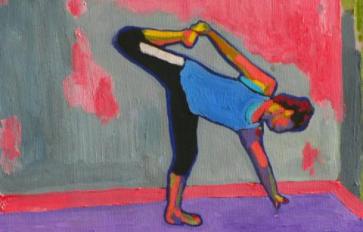
On the lookout for a yoga class? Here are ten things the yoga instructor may not tell you, but you should know beforehand.
I haven’t quite met the perfect yoga instructor yet. Some treat my body like an experiment—like they want to see how much it can be worked before it can be broken. Some treat it as if it were something sacred and become a tad creepy about it. Still, others don’t seem to care that I am panting my way through my breaths or have fallen asleep in the middle of a pose. Is there something wrong with me, I wondered—till I finally chucked the instructors and began to practice yoga myself through Internet videos and books. So no, I have not reached very advanced stages and perhaps I may never want to get there. But in my search for the perfect yoga instructor, I have discovered one thing—there may not be one. And this is because many instructors don’t really tell you a lot of things you should know if you want to learn and practice yoga in the long run. So here are the ten things about yoga my instructor(s) never told me and I had to learn the hard way, and a few things I had to unlearn along the way, too…
1. The “Certification” May Mean Zilch
When you meet a yoga instructor, you assume the “instructor” bit came for a rigorous certification course, right? Wrong. While there are plenty of authentic certification courses that come with watchful yoga practice of hundreds of hours, there are plenty of “schools” who host weekend certification courses. Which means your instructor may not even have his or her basics right. So learning yoga this way will not only be incorrect, but it can also prove to be hurtful to your physical wellbeing.
Solution: Do check up on the certificate your yoga instructor possesses, and if he or she has attended proper and verified yoga programs to get certified.
2. You May Not Be Up To A Class
Imagine being a yoga newbie, and suddenly get propelled into a class of headstands and inversion poses. For me, it was a stubborn case of no-can-do. I wasn’t exactly a yoga newbie but then a headstand wasn’t my cup of tea. While my yoga instructor insisted I could do it, I flat out refused and he acted like I was a spoilsport. The thing is, the instructors often force you to step out of your comfort zone but not to the point of making you do something you are absolutely uncomfortable with. They should train and encourage you, not bully you into poses you are not ready for.
Solution: You may choose to try the instructor’s suggestion but you can also choose to refuse. Make sure you are comfortable and confident in the poses you try—yoga is supposed to be fluid, not a clumsy attempt that leaves you out of breath.
3. Yoga Can Hurt You…
Well, yoga done right cannot hurt you. Sure, some poses will leave your muscles sore but that’s normal fitness fatigue that goes away in a day or two. If your instructor is making you do poses that actually hurt and hurt bad, you got the short straw in the instructor list. Get out while you can, taking your physical equilibrium and wellbeing into consideration. Also, make sure the instructor is watching you when you are ready to try the more advanced asanas, instead of being on Snapchat.
Solution: If a yoga pose is hurting you to the point of pain—and we don’t mean the muscle stretching pain—stop and ask the instructor to back off. Like any exercise, you build up to advanced yoga practice. You don’t bully your body into doing stuff that can harm it.
4. You “Do” Need A Mat
If the yoga class is such that they don’t use mats and practice on freshly mopped wooden floors, well and good. But if the yoga studio prefers to lend you mats at a cost, beware. You can get a whole Petri dish full of bacterial, fungal, and viral infections via the shared mats. Yoga makes you sweat, and sweat transmits infections.
Solution: If the yoga class is such that you need to use a mat, bring your own, period.
5. Teacher-Student Rules Work For Yoga, Too
A serious yoga instructor who is passionate about teaching and yoga will do just that, teach yoga. But not all instructors are in it for the learning and the satisfaction of teaching something well. Some are in it to make their social life better or even strike it lucky. Be wary of such people because this taints the yoga school’s reputation, too. Also, if the yoga instructor is all about flirtation and charm, would he or she really pay attention to actual yoga?
Solution: If you get an unwanted come-on, we suggest you talk to the school and quit the class. Frankly, even if the attraction is mutual, end the class and the choose to carry on the relationship, or not—just get your priorities right and find yourself a new yoga teacher.
6. Ask Permission Before Physical Contact
The one thing you need to remember about your body is that it is yours. While we understand that a yoga instructor, much like any fitness coach or trainer, may need to touch your body to correct a pose, the permission has to be sought and granted beforehand. The instructor cannot just walk up behind you and startle you by a tug or a shove, or even a touch you aren’t comfortable with.
Solution: Make the asking-for-permission deal clear to the instructor at the start of a class. And if you feel that you both are not on the same plane of understanding, switch classes or instructors.
7. Yoga Is “In” So We Do It
If your instructor teaches yoga just because it is the cool thing to do, he or she didn’t quite get it right. We understand that the yoga craze is on and probably will be for years to come. And it’s a good thing. The only problem being when health clubs who know nothing about yoga start yoga classes and they do not give them the right infrastructure. There may not be enough peace or the right instructors. The people who sign up often keep dropping in, way after the class has started, thus missing the essential warm up. So the seriousness or the passion needed to learn yoga the right way is often missing.
Solution : Sign up for a single test class before you go all the way. See if you get the right vibe from the school or club, the instructor and the other students.
8. My Yoga May Not Be Your Yoga
Yoga has many forms and can be as gentle-paced as you need or as fast-paced as you want. And the teacher may be as tough as a drill instructor or may light incense and insist all hold hands and chant. Still, others use all kinds of props. You have to make sure that you get the right kind of yoga—depending on your fitness, age, and other health factors. The teacher should suit you too—if you like a gentle pace, a pushy instructor will irritate you. And if you have joined yoga to sweat a bit, then incense and chants may not be your cup of tea.
Solution: Do you look forward to your class and your teacher? If the answer is a no, you are in the wrong class.
9. Yoga Isn’t An Apothecary Of Cures
Yoga does have many benefits—it will make you fitter, healthier and more stable in all planes of your body, be they physical, mental, or physiological. What yoga cannot do is cure just about anything and everything in a few classes. It is not an overnight process and even after years of practice, it may not be able to cure an illness. It does not have all-healing powers and anyone who claims otherwise is merely wanting you to sign up and pay for their classes.
Solution: If someone makes tall claims about yoga’s “healing prowess,” you may want another instructor.
10. You Don’t Need Long-Term Classes
Once you get the basics of yoga and have learned all the asanas you can, you don’t need to attend classes. It’s okay if you want to though—not everyone likes to practice yoga alone. If you like the hubbub of the class and the instructor’s way of taking you deeper into more complicated asanas, by all means, do carry on. But if you feel you have learned all you need to for the time, it’s your call whether to continue paying for classes or not.
Solution: As long as you have a flat surface, a yoga mat, and the muscle memory to do the asanas, you are good to go. You can always sign up for an advanced class later.
Your kind of yoga is the one you are comfortable doing, the one that is making a positive change in you and makes you feel good about yourself. Never let the instructor tell you otherwise.
If you have any tips to share with us on what to expect from a yoga class or an instructor, do write to us in the comments section below. Namaste!








